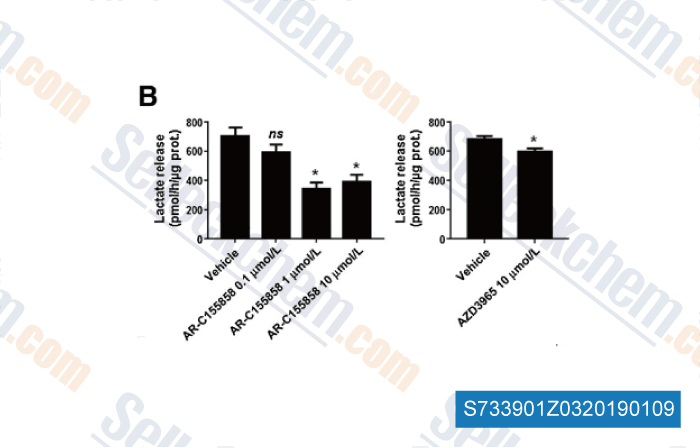|
Toll Free: (877) 796-6397 -- USA and Canada only -- |
Fax: +1-832-582-8590 Orders: +1-832-582-8158 |
Tech Support: +1-832-582-8158 Ext:3 Please provide your Order Number in the email. |
Technical Data
| Formula | C21H24F3N5O5S |
||||||
| Molecular Weight | 515.51 | CAS No. | 1448671-31-5 | ||||
| Solubility (25°C)* | In vitro | DMSO | 100 mg/mL (193.98 mM) | ||||
| Ethanol | 100 mg/mL (193.98 mM) | ||||||
| Water | Insoluble | ||||||
| In vivo (Add solvents to the product individually and in order) |
|
||||||
|
* <1 mg/ml means slightly soluble or insoluble. * Please note that Selleck tests the solubility of all compounds in-house, and the actual solubility may differ slightly from published values. This is normal and is due to slight batch-to-batch variations. * Room temperature shipping (Stability testing shows this product can be shipped without any cooling measures.) |
|||||||
Preparing Stock Solutions
Biological Activity
| Description | AZD3965 is a potent, selective and orally available monocarboxylate transporter 1 (MCT1) inhibitor with a binding affinity of 1.6 nM, 6-fold selective over MCT2. Phase 1. | |
|---|---|---|
| Targets |
|
|
| In vitro | In lymphoma cell lines that preferentially express MCT1, AZD3965 potently inhibits lactate transport and cell growth. [1] AZD3965 inhibits MCT1 activity in cells, and shows higher sensitivity in hypoxia. [2] In H526, HGC27 cells and DMS114 cells, AZD3965 increases intracellular lactate and significantly reduces lactate uptake. [3] |
|
| In vivo | In nonobese diabetic scid-γ mice bearing COR-L103 xenografts, AZD3965 (100 mg/kg, p.o.) reduces tumor growth and increased intratumor lactate. [2] In mice bearing H526 tumors, AZD3965 (100 mg/kg, p.o.) causes increased lactate concentration, a reduction in growth and increased radiation sensitivity. [3] |
Protocol (from reference)
| Cell Assay: |
|
|---|---|
| Animal Study: |
|
References
|
Customer Product Validation

-
Data from [Data independently produced by , , Cancer Res, 2017, 77(20):5591-5601]
Selleck's AZD3965 has been cited by 26 publications
| Lactate accumulation promotes immunosuppression and fibrotic transformation of bone marrow microenvironment in myelofibrosis [ J Transl Med, 2025, 23(1):69] | PubMed: 39810250 |
| Lactate metabolism in clonal plasma cells and its therapeutic implications in multiple myeloma patients with elevated serum LDH levels [ Cancer Metab, 2025, 13(1):9] | PubMed: 39948621 |
| A375 melanoma-derived lactate controls A375 melanoma phenotypes by inducing macrophage M2 polarization via TCA cycle and TGF-β signaling [ PeerJ, 2025, 13:e18887] | PubMed: 39995996 |
| Deciphering metabolic heterogeneity in retinoblastoma unravels the role of monocarboxylate transporter 1 in tumor progression [ Biomark Res, 2024, 12(1):48] | PubMed: 38730450 |
| H3K9 lactylation in malignant cells facilitates CD8+ T cell dysfunction and poor immunotherapy response [ Cell Rep, 2024, 43(9):114686] | PubMed: 39216002 |
| Lactate promotes myogenesis via activating H3K9 lactylation-dependent up-regulation of Neu2 expression [ J Cachexia Sarcopenia Muscle, 2023, 10.1002/jcsm.13363] | PubMed: 37919243 |
| A critical role for heme synthesis and succinate in the regulation of pluripotent states transitions [ Elife, 2023, 12e78546] | PubMed: 37428012 |
| A critical role for heme synthesis and succinate in the regulation of pluripotent states transitions [ Elife, 2023, 12e78546] | PubMed: 37428012 |
| A critical role for heme synthesis and succinate in the regulation of pluripotent states transitions [ Elife, 2023, 12e78546] | PubMed: 37428012 |
| Functional heterogeneity of MCT1 and MCT4 in metabolic reprogramming affects osteosarcoma growth and metastasis [ J Orthop Surg Res, 2023, 18(1):131] | PubMed: 36814318 |
RETURN POLICY
Selleck Chemical’s Unconditional Return Policy ensures a smooth online shopping experience for our customers. If you are in any way unsatisfied with your purchase, you may return any item(s) within 7 days of receiving it. In the event of product quality issues, either protocol related or product related problems, you may return any item(s) within 365 days from the original purchase date. Please follow the instructions below when returning products.
SHIPPING AND STORAGE
Selleck products are transported at room temperature. If you receive the product at room temperature, please rest assured, the Selleck Quality Inspection Department has conducted experiments to verify that the normal temperature placement of one month will not affect the biological activity of powder products. After collecting, please store the product according to the requirements described in the datasheet. Most Selleck products are stable under the recommended conditions.
NOT FOR HUMAN, VETERINARY DIAGNOSTIC OR THERAPEUTIC USE.
